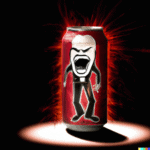Enigma Records got off to a good start with the first release – Motley Crue’s debut Too Fast for Love. Although originally released by Crue’s own label – Leathur Records – the company that would become Enigma took care of the manufacturing, marketing and distribution. Following the success of Too Fast for Love, Enigma began to release records under the Enigma Records label. The label specialized in punk and heavy metal records. Within a few years, Enigma entered a join venture with EMI to develop and sign emerging artists including the Red Hot Chili Peppers. Along the way, Enigma also started Restless Records and would eventually enter into an arrangement with Capitol Records where the joint partners would sign bands such as Poison and the Smithereens.
Berlin’s 1982 EP Pleasure Victim was an early release on the Enigma label. The success of this release would be the beginning of a string of albums throughout the 1980’s by artists as diverse as jazz fusion guitarist Allan Holdsworth to former teen idol David Cassidy. However, their sweet spot was punk and metal with bands such as Agent Orange, Stryper, The Dead Milkmen and Sonic Youth. Below is a list of some of the most notable releases on the Enigma label. I tried to include only albums that were truly on the Enigma label as well as a few that were part of the join venture with Capitol Records.
Pleasure Victim by Berlin (1982) – the first successful release on the Enigma label, Berlin’s Pleasure Victim was a surprise hit. After the initial success of the record on Enigma, Geffen Records picked up the album leading to mainstream success. The album would ultimately peak at #30 on the Billboard Top 200 and feature their first charting single – “The Metro” (#58).
The Yellow and Black Attack by Stryper (1984) – debut ep release by Christian hard rocks band Stryper. Enigma originally released in limited quantity since they were not sure the market size for a Christian heavy metal band. The ep was re-recorded and released with additional songs in 1986 and achieved commercial success.
Metal Fatigue by Allan Holdsworth (1985) – acclaimed guitarist Allan Holdsworth’s third studio album – and first on Enigma Records. The album is considered a classic of the jazz-rock fusion genre.
Real Nighttime by Game Theory (1985) – the second full length album from power pop legends Game Theory. This was the first of five studio albums for Enigma. The album was produced by Mitch Easter – who had previously produced R.E.M.’s Chronic Town, Murmur and Reckoning. Easter would later produce records for Love Tractor, The Connells, Velvet Crush and Pavement.
Soldiers Under Command by Stryper (1985) – the band’s second release and first full length album. Not only did the record sell more than 500,000 copies, it was the first Christian heavy metal album to achieve Gold status. The album peaked at #84 on the US Billboard 200 charts,
Look What the Cat Dragged In by Poison (1986) – one of the best selling debut albums by a hard rock band, Look What the Cat Dragged In peaked at #3 on the Billboard 200 and sold more than 3 million copies in the US. The album also generated two Top 20 hits in the US – “Talk Dirty to Me” (#9) and “I Won’t Forget You” (#13).
The Big Shot Chronicles by Game Theory (1986) – the third album by Game Theory and the second on Enigma. The critically acclaimed album was produced again by Mitch Easter.
Atavachron by Allan Holdsworth (1986) – Holdsworth’s second album (and final) on the Enigma label.
To Hell with the Devil by Stryper (1986) – the band’s second full length album exceeded the previous record in terms of popularity, selling more than 1 million copies and becoming the first Christian heavy metal album to be certified Platinum. The album peaked at #32 on the US Billboard 200 charts,
Lolita Nation by Game Theory (1987) – considered one of the power pop band’s best albums, Lolita Nation was nominated for a Bay Area Music Award for Outstanding Independent Label Album or EP.
Open Up and Say…Ahh! by Poison (1988) – the band’s second album would be even more successful than their debut, selling more than 5 million copies in the US and peaking at #2 on the Billboard 200. The album contained four major hits including – “Nothin’ but a Good Time” (#6), “Fallen Angel” (#12), “Every Rose Has its Thorn” (#1) and “Your Mama Don’t Dance” (#10).
Two Steps from the Middle Ages by Game Theory (1988) – Game Theory’s fourth and final studio album on Enigma.
In God We Trust by Stryper (1988) – the third full length album by Stryper continued their commercial success selling more than 500,000 copies and peaking at #32 on the US Billboard 200 charts,
Especially for You by The Smithereens (1986) – the band’s first full length album. The album peaked at #51 on the Billboard 200 and has sold more than 1 million copies in the US. The album featured two singles that were hits on the Billboard Album Rock Tracks Chart – “Blood and Roses” (#14) and “Behind the Wall of Sleep” (#23).
This is the Voice by Agent Orange (1986) – American punk rockers known for their blend of punk and surf rock. This was their second studio album and only release on the Enigma label.
Bucky Feline by The Dead Milkmen (1987) – the third studio album from the Dead Milkmen and the first of three released on Enigma Records. The album peaked at #163 on the Billboard 200.
Mean by Montrose (1987) – the band’s fifth and final album (after an 11 year hiatus), it peaked at #165 on the US Billboard 200 charts. The final version of the band is notable for lead singer Johnny Edwards who would eventually replace Lou Gramm as Foreigner’s singer and appear on their 1991 album Unusual Heat.
Recovery: Live! by Great White (1988) – thinly release on Enigma from American hard rock band Great White. The live album was released in between their two most successful studio albums – 1987’s Once Bitten… and 1989’s …Twice Shy (neither of which were released on Enigma Records. Six of the ten tracks were covers including Led Zeppelin’s “Immigrant Song” and The Who’s “Substitute.”
Total Devo by Devo (1988) – the seventh album from New Wave legends Devo and their first for Enigma Records. The album peaked at #189 on the US Billboard 200 charts. The single “Disco Dancer” was a minor hit on the US Dance chart, peaking at #45.
Daydream Nation by Sonic Youth (1988) – the first release by the alternative band after leaving SST Records. Daydream Nation is considered one of the most critically acclaimed and influential alternative albums of all-time.
Green Thoughts by The Smithereens (1988) – the band’s second album peaked at #60 on Billboard’s Hot 200 charts. The single “Only a Memory” cracked the Billboard Hot 100 at #92 and was #1 on Billboard’s Album Rock Tracks chart. The record was released on Enigma/Capitol label.
The Speed of Sound by Ronnie Montrose (1988) – guitar legend Ronnie Montrose recorded this instrumental album following his last album with his band Montrose.
Beelzebubba by The Dead Milkmen (1988) – their fourth studio album and second for Enigma Records. The album peaked at #101 on the US Billboard 200. The single “Punk Rock Girl” is their best known song – peaking at #11 on the US Billboard Modern Tracks chart.
The Tenement Year by Pere Ubu (1988) – the post punk band’s sixth album and only release on Enigma label. The album was a reunion of the band after breaking up in 1982.
Killer Klowns from Outer Space by The Dickies (1988) – EP from American punk rockers’ was their first release for Enigma.
Now It Can Be Told: DEVO at the Palace by Devo (1989) – Devo’s second album for Enigma and their second live album. The record contained songs from the Total Devo album as well as many of their classics including “Whip It” and “Girl U Want.”
The Whitey Album by Ciccone Youth – a side project of Sonic Youth along with Mike Watt of the Minutemen and J. Mascis of Dinosaur Jr.
Second Coming by The Dickies (1989) – the first (and only) full length record for The Dickies on Enigma Records.
David Cassidy by David Cassidy (1990) – Yes, that David Cassidy from The Partridge Family. After releasing six studio albums in the 1970’s – including his debit album Cherish, which peaked at #15 on Billboard’s Top 200 – Cassidy took a nine year break before releasing an album in 1985 – Romance. The album was not released in the US but was somewhat successful in Germany (#22)) and the UK (#20). Five years later – and 14 years after his last US release – Enigma signed Cassidy for his self-titled eight solo album. The album was his last to chart in the US – peaking at #136. The album is also notable for containing Cassidy’s last Top 40 hit – “Lyin’ to Myself” which peaked at #27 on the US Billboard Hot 100.
The Diva Station by Ronnie Montrose (1990) – Ronnie’s second solo album on the Enigma label.
Flesh & Blood by Poison (1990) – Poison’s third and final album on the Enigma label sold more than 3 million copies and peaked at #2 on the Billboard 200 charts. The album also contained two Top 10 hits – “Unskinny Bop” (#3) and “Something to Believe In” (#4).
Smooth Noodle Maps by Devo (1990) – Devo’s eight studio album and final album on Enigma. The album includes the single “Post Post-Modern Man,” which peaked at #7 on the US Modern Rock Tracks chart and #26 on the US Dance Chart. It would be last single to chart for Devo.
Metaphysical Graffiti by The Dead Milkmen (1990) – their fifth studio album – and third and final album for Enigma – peaked at #164 on the US Billboard 200. The album title and cover are best known as a take off on Led Zeppelin’s classic album Physical Graffiti.
Stay Sick! by The Cramps (1990) – the fourth studio album by rock band the Cramps and the their first of two for Enigma Records. The album included their only UK Top 40 single – “Bikini Girls with Machine Guns” (#35). The song was also a Top 10 hit on the US Alternative charts. The album peaked at #62 on the UK album charts, making it their second highest charting album in the UK.
Look Mom No Head! by The Cramps (1990) – the band’s fifth studio album and final record for Enigma Records. The album included Iggy Pop as guest vocalist on the track “Miniskirt Blues.”
Tinker to Evers to Chance by Game Theory (1990)













